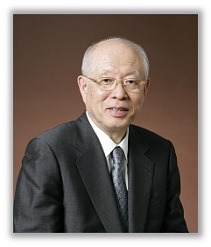
Ryoji NOYORI
Since its establishment in 2003, the Center for Research and Development Strategy (CRDS) has made a significant contribution by providing analyses of domestic and international trends in science and technology and by serving as a public think tank, providing proposals for policy-making in our country. We wish to continue to be a trustworthy navigator at the helm of the 'Nippon Maru', guiding the science and technology of our nation through rough seas.
Science, technology and innovation aims, of course, to enhance the well-being of the individual, ensure the safety, peace and prosperity of the nation, and, more universally, conserve the environment and sustain human life and culture around the world. While it is necessary to coordinate these activities globally, advancing on the basis of common agreement, there are urgent issues unique to our country. In addition to a huge accumulated public debt, Japan has a rapidly aging population, with a declining birth rate. There are also energy problems which are related to global warming. Poor in natural resources, our country has to find its own solutions.
For science and technology which support efforts to build a desirable future society, thought should be given not only to achieving greater efficiency and convenience in practical material terms, but also to fostering the social awareness which enhances respect for humanity and the preservation of basic human rights. By integrating the wisdom contained in the natural sciences, engineering, social sciences, humanities, etc., we must gain the unwavering trust of our society.
While the proposals of CRDS must be based on high principles, concrete measures have to be implemented at the same time. Although the training of the necessary human resources is essential, what can be achieved by the individual researcher or engineer, small collaborative groups or even a single institution is very limited. Most of the targets cannot be achieved unless they are matched by appropriate research systems, built on a number of key characteristics. In this era of open science, open innovation and the information network, close cooperation between industry, government and academia are indispensable, as are brain circulation and international cooperation.
I place my hope in the young generation, in their creative resourcefulness to invent the future, in their outstanding ability in science and technology, in their aggressive strategic action and, above all, in their high ideals.
Ryoji Noyori assumed the office of Director-General of CRDS, JST, in June 2015. Born in Kobe, he studied chemistry at Kyoto University, served as Instructor at the same university and was appointed Associate Professor at Nagoya University, Postdoctoral Associate at Harvard University, Professor at Nagoya University (1972-2003) and President of RIKEN (2003-2015).
Currently he holds the position of University Professor of Nagoya University and is a RIKEN Fellow. He is also a Member of the Japan Academy and the Pontifical Academy of Sciences and is a Foreign Member of, among others, the National Academy of Sciences in the USA, the Russian Academy of Sciences, the Royal Society in the UK and the Chinese Academy of Sciences.
As a scientist, Noyori is best known for his development of asymmetric catalysis using chiral organometallic molecular catalysts. His achievement was recognized by many prestigious awards, including the Order of Culture, the Wolf Prize in Chemistry and the Roger Adams Award. In 2001, he received the Nobel Prize in Chemistry together with K. B. Sharpless and W. S. Knowles.